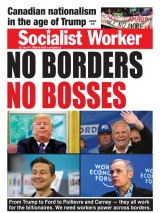News
You are here
Why the Bloc Quebecois?

October 22, 2019
The wild card that determined the outcome of the election is the resurgence of the Bloc Quebecois.
In Quebec, there is a shared class anger with the rest of Canada about austerity, jobs, and the climate. But there are also reasons why people in Quebec view some of the same issues differently.
Quebec is a nation within Canada with a right to self-determination. How that plays that out in elections has changed over time.
Ultimately, the explanation for the Bloc’s resurgence is less about the Bloc than the fact that there is no enthusiasm for any of the federal parties in Quebec – despite recent attempts to muster it.
In 2011, despite the NDP’s bad history in understanding Quebec’s distinct nature as a nation within Canada, Quebecois voted NDP in a remarkable Orange Surge against austerity – that crashed against the shores of Mulcair’s “balanced budget” campaign in 2015.
In 2015, despite the bad history of the Trudeau family in Quebec – the War Measures Act and suspension of civil liberties of ordinary citizens invoked by Pierre Trudeau in 1970 – Quebecois voted Liberal in large numbers to oust Harper.
Despite the fact that the SNC-Lavalin scandal got no real traction in Quebec for the Tories, Justin never became personally popular in Quebec in the course of his mandate.
In 2019, there are many reasons why people in Quebec are disenchanted with all federal parties. Not all reasons are progressive, notably the controversy over Law 21 on religious symbols. But a central reason is opposition to the Liberal Kinder Morgan/Trans-Mountain pipeline purchase, and the ongoing threat of pushing to run a trans-Canada pipeline through Quebec, which would be supported by both Liberals and Tories.
In this context, the Bloc became a place to park your vote simply to oppose the other parties. It was nota vote for a referendum on Quebec sovereignty: the only person who believed that is Andrew Scheer.
An actual vote in favour of Quebec independence, for all the reasons people might support that for progressive reasons, would not necessarily reflect the politics of the Bloc. They are a bourgeois party that has grown on the appetite for radical change in the absence of an alternative that speaks to all the complex and competing issues that shape how that anger within Quebec is reflected federally.
Just like in English Canada and elsewhere, the anger over the climate and growing economic disparity can go in different directions, and can be pushed off course by racism.
This has been happening in Quebec over the last decade and a half, and the Bloc Quebecois has pandered to the racism generated by the ruling provincial government of the CAQ, both on the question of religious symbols and immigration.
The CAQ itself did not win a majority of the popular vote in the provincial election of 2018. Its popularity, like the Bloc’s, has less to do with independence or sovereignty than steering legitimate sentiments for self-determination towards a racist identitarian nationalism.
The CAQ grew on the same basis as the Bloc: on a promise not to reopen the sovereignty debate but to stand up to Ottawa on issues of language and culture – and on so-called “secularism.”
Bill 21
In federal election campaigns of the past, the Bloc's nationalist critique of federalism has taken a progressive turn, notably on the federal government’s theft of Employment Insurance payments from workers. They have picked up on the pipeline issue (hard not to realize this is key) but also one of their issues of choice to face off against Ottawa telling Quebec what to do has been Law 21.
Law 21 puts self-determination to the test. As journalist Chantal Hebert noted, Quebecers felt during the campaign that all federal parties were ganging up on Quebec over it.
In fact, Jagmeet Singh was the one leader who understood and said clearly throughout the campaign that this law must be defeated within Quebec, not from outside – and not merely as a legal battle but by a battle to win the hearts and minds of the Quebecois.
People on the left in English Canada have to take this to heart themselves: this is a debate that cannot be settled by a decision imposed by the Canadian state. Even those within Quebec who are working against Law 21 know it is a grassroots political battle, not just a legal or electoral one, and not something that can be imposed from the outside.
And ultimately, the vote for the Bloc is a condemnation of the lack of choice offered to the people of Quebec. The left party Quebec solidaire decided to take no position in the federal election.
The struggle for change in Quebec remains in the streets with the half a million young Quebecois who on Sept 27 who voted with their feet against climate change. They will have to ultimately show the same resolve against racism, which for most will be in ways that have nothing to do with this election.
Section:










